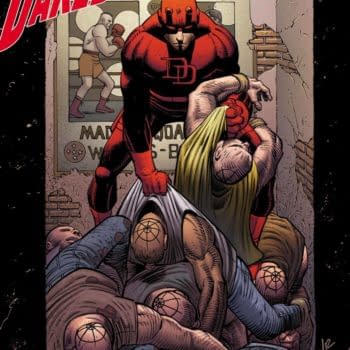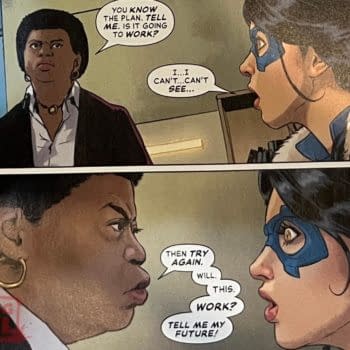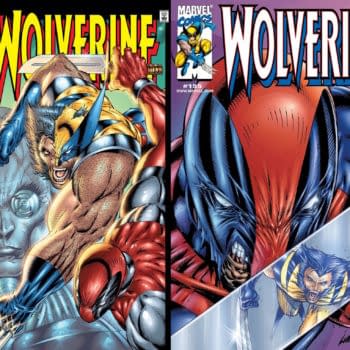Posted in: Comics, Indie Comics | Tagged: brian pulido, charlie stickney, crowdfunding, editorial, girl genius, Independent, indie Comics, iron circus, kickstarter
A New Wave of Indie Creators Is Upending Mainstream Comics
In the comics industry, a creator's success is often measured by how much work they get at Marvel and DC. The goal of many creators, especially writers, seems to be to create enough of their own personal stories in order to get considered to write for established characters owned by a corporation. It makes sense, of course, because surviving off of indie comics can be a difficult task, and the Big Two can pay page rates that indie companies could never hope to scratch. However, the mainstream comics industry is not the end-all-be-all of success in this field. In fact, some of the biggest success stories in comics go unnoticed by the creator community because they're not happening where everyone is looking. A wave of crowdfunding comics creators has been building from a quiet rumble into a roar in recent years, to the point where the strength of this indie movement has been impossible to ignore. With creators using platforms like Kickstarter to build their businesses and create their art, what can mainstream publishers offer them that they haven't already done themselves? Let's take a look at four such creators and what we can learn from their success stories.

Studio Foglio, creators of Girl Genius
Girl Genius, written and drawn by Phil and Kaja Foglio, sets the standard for how a creator can build on an audience through longevity, word of mouth, and consistency. They have been publishing the steampunk webcomic since 2001, and are true veterans of the craft. One would think that they are underrated from the way they aren't included in lists of the genre's greats and how Girl Genius isn't a part of the comics conversations on social media. However, the Foglios' Kickstarter success tells a different story. Their latest volume, the 18th installment in the series, made over $150,000 on the crowdfunding platform. A glance at their Twitter following, which comics creators have historically put a lot of stock in, compared to the much loftier numbers that they bring in on Twitter speaks to the power of a true connection with their audience. The Foglios are the embodiment of indie creators seeking meaningful interaction with readers over engagement for the sake of engagement.
Iron Circus Comics, publisher of Smut Peddler
C. Spike Trotman has raised over a million dollars as an indie publisher, using Kickstarter to carve out a unique spot in the comics industry for Iron Circus. Not all of Iron Circus' comics are put on the platform, and the company does solicit through Diamond, but that success comes from a creator who brings that DIY, indie energy not only to her own creations, but to publishing work by indie creators as well. Trotman said, in an interview with Black Nerd Problems:
"There is, like… NO money in comics. There are readers, there are creators, there's a ton of passion and a ton of community support and so much interest and it's all growing, but it's important to maintain perspective; comics is a tiny subset of the entertainment industry, and most of us don't do this exclusively. […] It demands EVERYTHING. Honestly, it's only just starting to feel like it's even going to pay off. TEN YEARS LATER."
Comics has a habit of weeding out those who can't continue fighting, and C. Spike Trotman is unique in that her fight has been for other creators and, through that, for the larger comics community. Her approach as a publisher goes against the machine that grinds out creators, creating bitter veterans jealous of the new guard, and a new guard who looks at the creators they grew up reading as cautionary tales.

Charlie Stickney, writer of White Ash
A question that well-meaning interviewers often ask indie creators who fund their work through Kickstarter is: "So… are you going to take it to a publisher now?" This question, which assumes that the creator producing, printing, and selling the work to customers isn't the definition of publishing, is a symptom of a misunderstanding the mainstream comics industry has about this new way. Charlie Stickney, co-creator and writer of White Ash and The Game, understands this well. From his very first campaign, which funded White Ash #1, he has functioned at the level of a publisher with a full staff of employees. His comics had a plan for merch before they even had a fanbase, and the professionalism of that approach and the quality of the content is itself what created that fanbase. Charlie's powerhouse campaigns have seen White Ash grow from issue to issue as he releases single issues to success in a market where graphic novels are king. Scout Comics has brought on Stickney as Publisher as a result of his business prowess, and it makes sense. The future of comics is creators who build from within, and publishers that can recognize that, bring them on board, and allow them to do their work without interference may just fix a bit of the rot at the root of the relationships between publishers and creators.
Brian Pulido, creator of Lady Death
Finally… the unspoken king of indie comics. Brian Pulido's "bad girl" approach may be written off by some as out of vogue, but the numbers don't lie. Pulido's success should put him in the same conversation as the highest paid, most read comics writers at the Big Two, but the mainstream comics community just hasn't caught on. The work may not be to their taste, but it's impossible to ignore success at this level. Taking a look at his last five campaigns, here's what Pulido's Kickstarters pulled in:
- La Muerta #1: Retaliation: $137,325
- Lady Death: Malevolent Decimation #1: $347,045
- Hellwitch: The Forsaken #1: $180,272
- Lady Death: Blasphemy Anthem #1: $323,866
- La Muerta #1: Ascension: $105,616
Now, the obvious: Lady Death is an established property that Brian Pulido has had decades to build. Still, in an industry where Marvel and DC have to cancel comics series while the same series has a successful TV show, Pulido launches campaigns that make tens of thousands of dollars within the first five minutes of launching. He has mobilized an army of dedicated readers that want more of what he's creating, no matter what it is. A new series? They want it. A Lady Death pin? They're in. Put his character on a scarf? They're scarfed out. Pulido is a power player in the indie comics industry of the highest sort, and the fact that the community at large doesn't recognize that speaks to an existential issue in this medium: many of the publishers and even creators who seem at the top of the industry don't know where the readers are, and are grasping in the darkness to find them. Meanwhile, the creators who organically build fanbases over years with constant content, true engagement, hard work, and a purposeful decision to cut out the middle man are building a new and powerful wave that is about to sweep comics as we know it.
Now, a question: When is the last time a Brian Pulido comic, or a comic by any of the above creators, received media or creator attention? With a profit margin as high as it seems creating a 48-page comic in exchange for hundreds of thousands of dollars would be, and a fanbase that eager for new material, it makes one wonder… could there be gatekeepers scared of an industry led by creators and not corporations?
What now?
Two major industries, music and comedy, have entered eras where the gatekeepers of old are being dismissed. Musicians are forgoing traditional labels to release content with no middle man, and comedians such as New York renegade Andrew Schulz are dropping their representation in order to build followings through word-of-mouth and podcasts. With the control falling into the hands of the creators across every form of art, how long will it be before comics creators realize that they don't need the publishers… the publishers need them. What happens, then, when creators stop playing ball?













